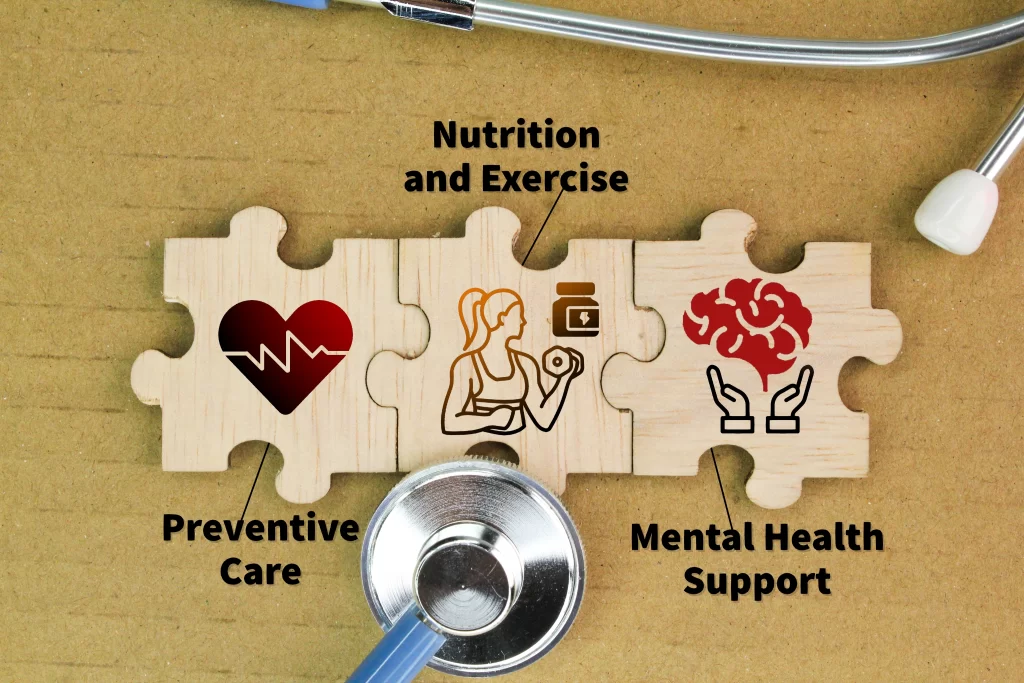In an increasingly complex and demanding world, the well-being of students is paramount. While academic excellence has traditionally been the sole focus of educational institutions, a paradigm shift is underway. We are realizing that genuine learning and holistic development cannot occur in isolation from a student’s mental health. Integrating mental health awareness and support into the very fabric of our education system is not just a moral imperative, but a strategic necessity for fostering truly successful and resilient individuals.
Mental health significantly affects students' academic performance and social interactions.
The connection between a student’s mental state and their ability to learn, engage, and thrive is undeniable. When students grapple with mental health challenges, their concentration wanes, motivation dips, and their capacity to absorb new information is severely hampered. Imagine a student at C3S Business School trying to master complex financial models or strategic management concepts while battling overwhelming anxiety or persistent sadness. Their cognitive functions, memory retention, and problem-solving skills are directly impacted. This isn’t just about grades; it’s about their fundamental ability to access and benefit from the education they are receiving.
Beyond academics, mental health issues profoundly affect social interactions. Students may withdraw from peers, struggle with communication, or find it difficult to participate in group projects – a crucial aspect of global business education. This isolation can exacerbate their struggles, creating a vicious cycle that further degrades their well-being and academic potential. “Mental well-being is the bedrock upon which academic success is built. Without it, even the most brilliant minds can struggle to perform,” observes Dr. Maria Fernanda Dugarte, Dean and Director of Institutional Affairs at C3S Business School in Barcelona, Spain. The pressure within a business school in Spain can be intense, making mental well-being a foundational element for success.
Early awareness helps in identifying issues like anxiety, depression, and stress among students.
The earlier mental health challenges are recognized, the more effectively they can be addressed. Childhood and adolescence are critical periods for brain development and identity formation, but they are also times when many mental health conditions first emerge. By integrating mental health education for students into the curriculum, we empower them with the vocabulary and understanding to recognize symptoms in themselves and their peers. This proactive approach can make a monumental difference. Without this awareness, subtle signs of anxiety, depression, or chronic stress might be dismissed as typical teenage angst or academic pressure, delaying crucial intervention.
“Catching mental health issues early is like treating a wound before it becomes infected. The earlier the intervention, the less intrusive and more effective it tends to be,” states Dr. S A Basha, Director of London College of Business, a London-based B School located in Barking. This early identification is vital for preventing the escalation of conditions that could lead to more severe long-term consequences. For students aspiring for global business education at a Best Business School in Spain, understanding and managing stress is particularly pertinent given the competitive and demanding nature of such programs. Providing clear mental health resources for students is key.
Schools and colleges must provide supportive environments and access to counseling.
An education system truly committed to student well-being must move beyond mere awareness to active support. This means creating environments where students feel safe, heard, and understood, and where seeking help is normalized. Providing readily accessible counseling services, staffed by qualified mental health professionals, is non-negotiable. These services should be discreet, confidential, and culturally sensitive. Students should know where to go and whom to speak with without bureaucratic hurdles.
“A supportive environment is one where students feel safe to be vulnerable. It’s not just about having a counselor, but about fostering a culture where asking for help is seen as a strength, not a weakness,” affirms Hiren Raval, Chief Executive Officer, C3S Business School based in Barcelona, Spain. This includes ensuring that the physical and social spaces within institutions, from the classrooms to the dorms, promote positive mental health. Universities, especially those aiming to be among the best business schools in Spain, must view student support as an integral part of their commitment to educational excellence. Providing comprehensive mental health resources for students is a hallmark of a truly progressive institution.
Mental health education promotes emotional intelligence and resilience.
Beyond addressing distress, mental health education plays a crucial role in developing essential life skills. It promotes emotional intelligence, enabling students to understand, express, and manage their emotions effectively. This includes learning about self-awareness, self-regulation, empathy, and social skills – all vital for personal well-being and professional success. Resilience, the ability to bounce back from adversity, is another critical outcome. By equipping students with coping mechanisms, problem-solving skills, and stress management techniques, mental health education for students empowers them to navigate life’s inevitable challenges more effectively.
“Emotional intelligence is as important as academic intelligence, especially in the fast-paced world of global business. It allows future leaders to understand themselves and others, fostering stronger teams and more compassionate leadership,” notes Dr. Aida Mehrad, Head of Academics at C3S Business School in Barcelona, Spain. For students at a business school in Spain, such as C3S Business School, these skills are not just for personal growth but are directly applicable in navigating diverse corporate environments and leading international teams.
Teachers and staff need training to identify and respond to mental health red flags.
Teachers, lecturers, and administrative staff are often the first line of contact with students. They are uniquely positioned to observe changes in behavior, academic performance, or social patterns that might indicate a mental health struggle. However, without proper training, these “red flags” can easily be missed or misinterpreted. It is imperative that educators receive comprehensive training on mental health literacy, including how to recognize symptoms, approach students with empathy, and know when and how to refer them to professional support. This training should emphasize active listening, non-judgmental communication, and the importance of confidentiality.
“Our educators are not therapists, but they are critical first responders. Equipping them with the knowledge to identify distress and guide students to the right help is a fundamental responsibility of any educational institution,” says Professor Mani Tahriri of C3S Business School, counted among the best business schools in Spain. This training should be ongoing, providing updates on best practices and emerging challenges. By empowering staff, institutions create a web of support that extends beyond the counseling office, embedding mental health awareness for students throughout the campus environment. This is vital for any top Business School in Spain aiming for holistic student development.
Peer support programs can foster a culture of empathy and understanding.
While professional counseling is essential, peer support offers a complementary and invaluable layer of support. Students often feel more comfortable opening up to their peers, who may share similar experiences and understand the unique pressures of student life. Peer support programs, where trained students offer non-judgmental listening, empathy, and signposting to professional help, can significantly reduce feelings of isolation and stigma. These programs also empower student leaders, fostering a sense of responsibility and community.
“Peer support breaks down barriers. When students see their friends speaking openly about mental health, it normalizes the conversation and encourages others to seek help,” observes Prof Marc Sanso, Head of Academics of Aspire Business School in Spain. Such initiatives are particularly impactful in a diverse setting like a global business education environment, where students come from various cultural backgrounds and may face unique challenges in a new country. Establishing such programs, perhaps through a student welfare committee, can reinforce the message that mental health is a shared community responsibility. This approach ensures mental health resources for students are more accessible.

Reduced stigma encourages students to seek help without fear or shame.
Perhaps one of the greatest barriers to addressing mental health challenges is the pervasive stigma surrounding it. Many students fear being judged, labeled, or discriminated against if they admit to struggling. This fear often leads to silence, isolation, and a worsening of their condition. Integrating mental health awareness into the education system, through open discussions, educational campaigns, and visible support structures, can significantly reduce this stigma. When mental health is treated with the same importance as physical health, it signals that these issues are treatable and that seeking help is a sign of strength, not weakness.
“The greatest victory in mental health awareness is when a student feels as comfortable seeking support for anxiety as they would for a broken arm,” emphasizes Professor Xavier Puertas at C3S Business School. Institutions like C3S Business School, striving to be a top Business School in Spain, must actively work to destigmatize mental health by promoting inclusive language, showcasing success stories of recovery, and integrating mental wellness into broader student life. This cultural shift is essential for ensuring that mental health resources for students are actually utilized, fostering a truly supportive business school in Spain.
Integrated mental health policies lead to healthier, more productive learning environments.
A fragmented approach to mental health support is often ineffective. For lasting change, mental health awareness and support must be integrated into comprehensive, institution-wide policies. This includes policies on student welfare, academic accommodations for mental health challenges, crisis intervention, prevention strategies, and a clear referral pathway. Such policies ensure consistency, accountability, and a holistic approach to student well-being. They signify that mental health is not an afterthought but a core component of the institution’s commitment to its students.
“True support comes from a comprehensive policy framework that permeates every level of the institution – from academic guidelines to administrative procedures,” states Professor Eduardo Ortiz, C3S Business School, Barcelona, Spain. For any business school in Spain that aims for excellence in global business education, these integrated policies are crucial for fostering not just academic rigor, but also a supportive and thriving atmosphere. A productive learning environment is one where students feel secure enough to focus on their studies without overwhelming mental health burdens. At C3S Business School, it is ensured that productive learning environments are built upon integrated mental health policies.
Parental involvement plays a crucial role in supporting students' mental well-being.
While educational institutions play a vital role, parental involvement remains indispensable. Parents are often the first to notice changes in their child’s behavior or mood. Schools and colleges should actively engage parents in mental health awareness initiatives, providing them with resources, information, and support. This can include workshops on how to talk about mental health, signs to look for, and available support services. A collaborative approach between parents and institutions ensures a consistent and comprehensive support system for students.
“Parents are invaluable partners in a child’s mental health journey. When home and school work in tandem, the student benefits from a reinforced network of care and understanding,” says Dr. Fernando Velasquez Villalba, a senior faculty at C3 Business School, Spain. Building trust and open communication channels between institutions and families is key to creating a unified front in supporting student mental wellness. This partnership strengthens the overall impact of mental health education for students.
Technology (apps, virtual counseling) can enhance access to mental health resources.
In the digital age, technology offers powerful tools to expand access to mental health support, especially for students who may face geographical barriers, time constraints, or feel uncomfortable with in-person counseling initially. Mental health apps offering mindfulness exercises, mood tracking, cognitive behavioral therapy (CBT) modules, and virtual counseling platforms can provide convenient and immediate support. These digital resources can serve as a crucial first step for students seeking help, bridging the gap to more intensive interventions when needed.
“Technology allows us to democratize access to mental health support, making it available at students’ fingertips, regardless of their location or schedule,” observes Dr. Francisco Rosique Gill, a senior visiting faculty at C3S Business School, Barcelona. For institutions offering global business education, virtual counseling is particularly beneficial for international students who might be far from home and prefer culturally sensitive support. Integrating these digital mental health resources for students ensures that help is always within reach, reinforcing the commitment of institutions like C3S Business School to holistic student welfare.
Let us Sum up!
Making mental health awareness a core part of the education system is no longer optional; it is a fundamental pillar of modern education. By fostering early awareness, providing supportive environments, training staff, encouraging peer support, reducing stigma, integrating comprehensive policies, involving parents, and leveraging technology, educational institutions can create healthier, more resilient, and ultimately more successful individuals. The future of global business education, exemplified by institutions like C3S Business School, depends not just on academic rigor but on nurturing the complete well-being of its students, ensuring they are well-equipped to thrive in a complex world. As Bela Desai, Head of Business at C3S Business School in Barcelona, aptly puts it, “Our responsibility extends beyond textbooks; it encompasses fostering minds that are resilient, empathetic, and ready to lead with integrity.” This holistic approach is what truly distinguishes the best business schools in Spain and marks them as leaders in preparing the next generation of global citizens.





